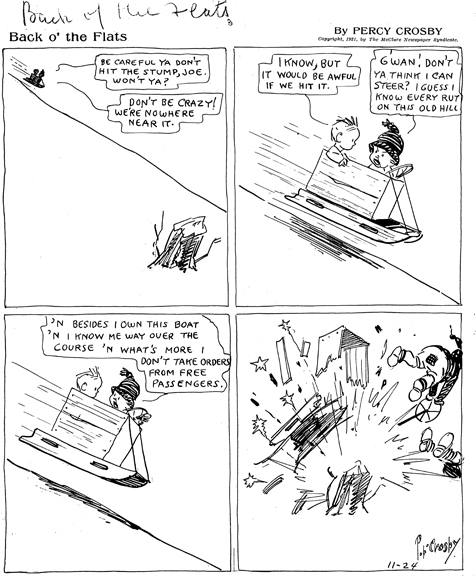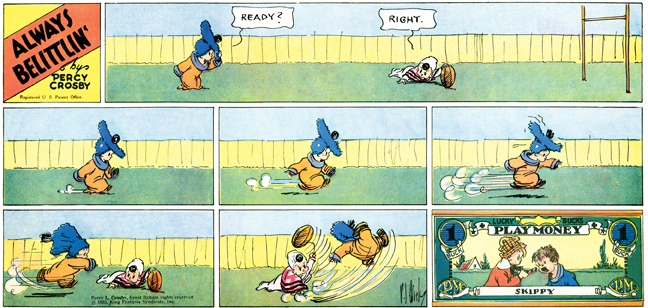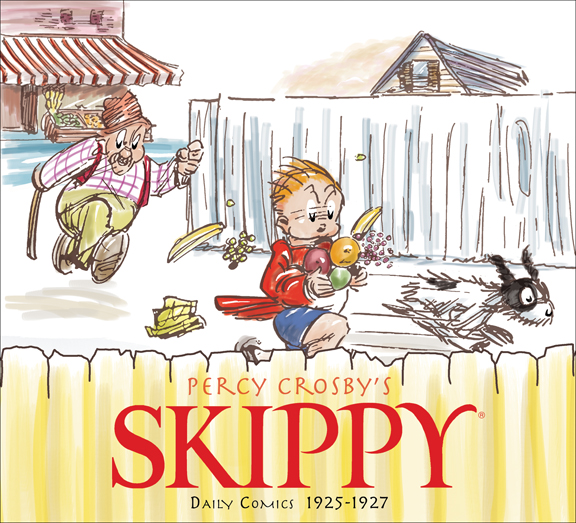Interview: Jared Gardner on IDW’s Skippy Vol. 1
Jared Gardner is a Professor at Ohio State University who has previously worked with The Library of American Comics on Cartoon Monarch: Otto Soglow and the Little King. Now he’s co-editing with Dean Mullaney Skippy Vol. 1: Complete Dailies 1925-1927 by Percy Crosby from IDW & The Library of American Comics. He’s also writing a biographical essay on Crosby for the book. Westfield’s Roger Ash contacted Gardner to learn more about Crosby and Skippy.
Westfield: For those who aren’t familiar with Skippy, what can you tell us about the comic strip?
Jared Gardner: Skippy was created by Percy Crosby in the old Life magazine in 1923, where Crosby had been publishing comics for over a decade. Aside from a popular series of single panel cartoons about the life of a World War I soldier (based in part on Crosby’s own experiences), Skippy was Crosby’s first hit and its success at Life led to his very successful migration to newspaper comics in the middle of 1925.
Skippy is a kid strip in the long genealogy that began with Outcault’s Yellow Kid and Buster Brown and Dirks’ Katzenjammer Kids, but arguably closest to that other pioneer of the genre, James Swinnertson’s Jimmy, which featured a middle-class kid in the city constantly distracted in his daily errands by the wonders and cacophony of the modern city. Like Swinnertson’s Jimmy, Crosby’s Skippy is relatively better off than his regular companions, but he rebels at the decorum of middle-class life and seeks out adventures, friendship and fun among the diverse community that populates Vessey Street.
Unlike Jimmy, however, who was forever wide-eyed and largely mute in the face of the wonders he encountered, Skippy is a philosopher, an ethicist and a politician. And this more than anything else is where Skippy changed comics—and the reason why Crosby was such a profound influence on post-war cartoonists such as Charles Schulz (Peanuts) and Walt Kelly (Pogo). It is also, later in his career, the aspect of the strip that would confuse and even outrage many editors and some readers, as we will see in later volumes.
Westfield: What about Skippy appeals to you?
Gardner: Long before I noticed the humor of the strip or its meditations on such some of the big issues of its day, I was blown away by Crosby’s pen. More than any other cartoonist I can think of before or after (Bill Watterson [Calvin & Hobbes] is the closest heir), Crosby was able to catch the electric energy, the patterned chaos of childhood on the page. Even when Skippy is just sitting still with his best friend Yacob pondering life’s imponderables the lines dance and buzz. Like a lot of comics fans, I can’t help but want to figure out how my favorite cartoonists do what they do by trying it myself, but with Skippy I have never even tried. There was something magic in his pen, and I would read this strip even if it was written in a language I could not read. Fortunately, he was also a brilliant writer too, and happily for me he did write in English.

A pre-Skippy strip by Crosby that features a theme that would later be used in Bill Watterson's Calvin & Hobbes.
Westfield: You’re writing a biography of Skippy creator Percy Crosby in the book. Can you tell us a bit about him and what readers can look forward to in the book?
Gardner: Percy Crosby’s life is a fascinating and tragic tale, with all the drama, hubris, betrayals, wrong turns, dizzying highs and terrible lows of a Shakespearean tragedy. When he created Skippy Crosby was already in his 30s, an experienced cartoonist and an engaged politician and philosophical thinker. The first volume will trace out his biography up through the first years of the strip, including his experiences working as a cartoonist for a socialist newspaper during the horrific Triangle shirt factory fire of 1911 and as a cartoonist working from the front lines during World War I. In very different ways, these early experiences made him think of the stakes and the role of cartoonists in world historical terms far beyond what any creator of a kid strip would have aspired to before.

Always Belittlin' was a topper to the Skippy Sunday strip. This one features a gag that Charles Schulz would later use in Peanuts.
The subsequent volumes will trace out Crosby’s rise to fame following the tremendous success of Skippy, as well as his mounting legal entanglements as he began what would become a multi-generational battle with corporate forces both seen and unseen over property rights to his creation. There will also be, perhaps inevitably, smaller-scale human tragedy of the all too familiar kind, including marital problems, struggles with alcohol and depression, and with squirrelly editors and publishers.
Crosby’s end was truly a tragic one, as he ended up confined against his will to a psychiatric hospital, his strip canceled and feeling abandoned by his peers and his readers. We know from our research that his peers did not forget him (although we don’t know, sadly, whether their words to that effect ever reached him in his final years), but it is undeniable that most readers have been unable to experience the wonders of Crosby’s greatest creation. As a long time collector of any clipping I could find in my fanboy’s attempt to recover this lost creation, I am unbelievably thrilled to have a chance not only to work on restoring Skippy to its vital place in comics history but to one day be able to have the complete strip done up in the inimitable Library of American Comics style to reread well into my dotage.
Westfield: Why do you think this book makes a good addition to the Library of American Comics?
Gardner: One of the misconceptions comics fans often have of Skippy, available as it has been only in decades-old reprints of small runs, is that it is primarily a gag-a-day strip. Heck, until we started putting together several complete years of the strip, even I thought that continuities were a rare exception in the strip. One of the revelations of seeing the strip as it was originally printed is the rediscovery of why America fell so in love with Skippy and his pals. Crosby was a master of pacing, character development, and he utilized short and long continuities throughout to explore relationships, to make multi-dimensional even minor characters and, especially in future volumes, to explore political and philosophical issues. Any attempt to winnow down the strip to a “best of” volume would lose the rhythms and pacing of Crosby’s storytelling, we realized early. And anything less than the full-scale Library of American Comics treatment would be a disservice to the comics history the series is dedicated to preserving and (in this case) recovering.
Westfield: If this book does well, will there be additional Skippy volumes?
Gardner: Most definitely! If we all live long enough, we intend to see this through to the end, Sundays included (and as readers will see, Sunday Skippys are a revelation in and of themselves).
Westfield: Any closing comments?
Gardner: Just a couple of shout-outs— to Dean Mullaney for letting me be part of this dream project; to Joan Crosby Tibbetts, Crosby’s daughter and the great defender of his legacy, for trusting us to do right by her father’s creation; and to you, Roger, for giving me an opportunity to wax rhapsodic and for your support of the work of the Library of American Comics over the years.
Purchase
Skippy Vol. 1: Complete Dailies 1925-1927










USER COMMENTS
We'd love to hear from you, feel free to add to the discussion!